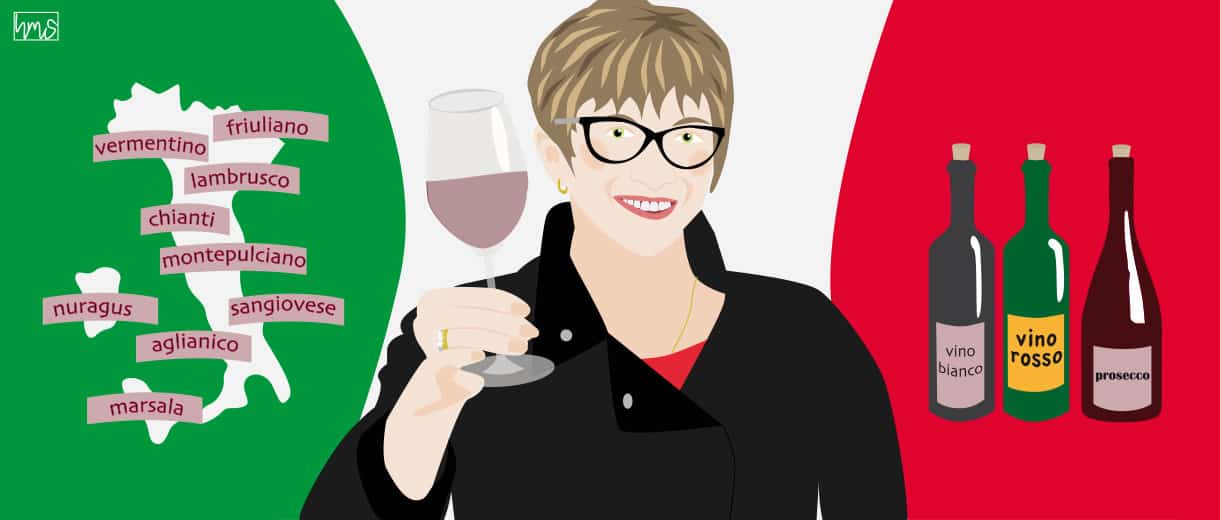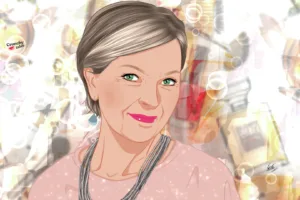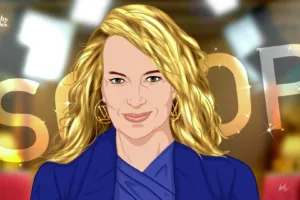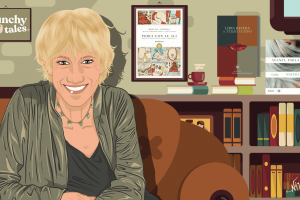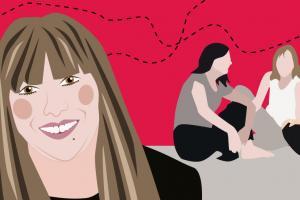Wine Expert Michèle Shah: “A Fine Woman Will Never Go Unnoticed”
Wines have no secrets for Michèle Shah and neither does the art of ageing like a fine wine. As round as a tasty red, the wine critic, travel writer and marketing consultant has several strings added to her bow. For Michèle, who has been exploring the vineyards, wineries, and wine cellars of Italy for over three decades, learning the lessons of living beautifully from the bounty of the terroir, it’s never too late to reboot your life: “as long as you want to do it – she said to CrunchyTales- then there’s no reason why you shouldn’t accept the challenge”.
Michèle, what has sparked your love for wine and gastronomy? And in particular, what has pushed you to become a female entrepreneur in such a male-dominated field?
I was very fortunate to grow up in a family that loved food and wine. I basically grew up in Italy where my parents moved to when I was 6. Despite being sent to boarding school in the UK from the age of 9 to 17 I spent all my school holidays in Italy.
Food and wine were much discussed at the family table between my parents and friends. It was about the quality of the food, the ingredients, the flavours and of course the wine. I remember Tuscan wine came in those 1.5 litre straw-covered flasks, which at the time was not synonymous of cheap or bad quality wine, it was perfectly good Chianti. Only later, after the 1980’s did the entire Italian wine scene revolutionize into producing quality wines rather than the quantity of wine. But before I ramble off onto another track, Italian wine and food were always good and tasty. Especially when I compared it to my English boarding school food! I am sure this was also partly what made me appreciate the amazing flavours of Italian food and its ingredients. I could say that this gave me a grounding for my interest in good food and wine and I was lucky that I travelled a fair amount when growing up and extensively later in life.
I am fortunate that I have been exposed to many cuisines across the globe and one of my joys of travel and getting to know a country is through its food and wine.
How has the role of the sommelier changed in the last 20 years?
I think it has changed quite dramatically, as up to the 1970s and ’80s there were really only a few countries identified for ‘good’ wine, such as France, which for many years reigned as being the most prestigious wine-producing country. But as I mentioned earlier Italy always had potential as did Spain, Portugal, which was basically only recognized for its Port and other countries like Austria, Germany for super Riesling wines and Hungary, known for Tokai. These countries have always made some excellent premium wines that could age beautifully. Today we have proof of this. However, in addition to the ‘old world’ countries in the ’70s and ’80s there were wines coming from the ‘new world’ such as Australia, New Zealand and South Africa and to top this also from South America as Chile and Argentina began to capture the wine scene. It’s not that these countries didn’t produce wines before, it’s just that they were not exported globally and therefore little known outside their country of origin.
So, to get back to your question, yes, the sommelier scene has dramatically changed because the wine scene today is so diverse, so specialized and so vast. Also, there are more wine associations that have developed in different countries giving potential to sommeliers and wine experts to make their mark in the trade. All good restaurants have a sommelier and often the restaurant business is commended and awarded thanks to its sommelier staff often led by head female sommeliers.
What are the major challenges for all those ladies working in the wine industry?
The challenges today are far fewer than they were, as equality between men and women improves in this sector. Of course, the wine industry on all levels from winemaking to wine tasting has been male-dominated, but so have the kitchens of the best restaurants. Today I would say that men and women have equal opportunity and potential in the industry, although there are some pockets which are still ‘old school’, but this is, fortunately, dying out. I see wineries from all corners of the globe include a good number of women in the technical sphere as well as in marketing and tasting.
Have you encountered any situations where you were made aware of your age and gender in the food & wine industry? If so, how did you tackle this?
I don’t think I have been made aware of my age by anyone purposefully making me feel that I was too old and past it, but of course, Millennials and GenZ and GenX are geekier (more apt to do things on-line, explore more) and have different ideas and attitudes, so it is normal to feel the generational gap when talking to or working with them. I try to be myself and act my age (which you can sort of say is what you feel yourself inside, it is often difficult to define age), and learn what I can from the younger generations as I think they have a lot to offer in terms of new ideas and new approaches to food and wine.
If ageing is a chance to become who we really are, why is this still perceived as an issue for many people?
I think that many people would wish if they could to stop time and continue to bask in youth and youthful activities. I personally am a very active person, I like challenges and often do not think too consciously about my age (62). I find that at times I am forced to negotiate with this as I realize there are a number of things I can’t do anymore and I don’t want to do anymore, however, I accept this and yes, sometimes I do wish I had more energy and time!
What are the biggest stereotypes about ageing that women need to challenge?
That you haven’t got the endurance to bring forward a project especially if you are competing in a ‘male’s world. That you should retire and be at home with the grandkids, that you haven’t the figure of a 30-year-old.
The New York Times has recently cast a light on the #MeToo movement in the wine industry reporting about women experiencing harassment in this field. Have you ever found yourself in any unpleasant situations?
Fortunately not in this sphere, but I got into wine as a business when I was in my 40’s, before that I worked in Rome (1985-1995) in the field of agricultural development in business development for a private UK consultancy company which had a base in Rome servicing the UN organizations based in Rome such as WFP (world food programme), FAO (Food & Agricultural Organisation), and IFAD (International Fund for Agricultural Development). I was their Business Development Manager visiting these organizations on a weekly or daily basis depending on the business at the time, promoting the services of specialist consultants in the agricultural field which were affiliated to the company. My clients were Project Officers in these organizations. My meetings were 70% with men, usually about 15-20 years older than myself and the consultants I promoted through the company were 95% men!! At that time there were few women in the field of agricultural development. It was a real man’s world I was working in.
The secretaries of these organizations were, of course, all women! I did, once in a while, get the vibes that the project officer I was talking to was more intent on me, rather than what I was trying to explain with regard to business and this was very irritating.
Your expertise spans from the food & wine industry to tourism. Has your eclectic background influenced your personal approach to ageing? If so, why?
Yes, I think so especially with regard to diet and exercise. Up until a couple of months before covid19 exploded and before lockdown, I usually spent about 200 or more days of the year travelling and entertaining different groups of people, from wine lovers to international press and trade such as importers of wine. This involved organizing, managing events, travel and being invited to amazing restaurants and wineries where the eating and drinking seemed endless or should I say ‘bottomless’. So much that in 2018 I was rushed to hospital with acute pancreatitis which fortunately I survived and have been on medication and diet since.
I have always been very active physically, I like doing gym, yoga, walking, skiing and whatever sports I can still cope with and have made this part of my life – even more so now than two years ago! While travelling and working on the go I had little time to exercise and the temptation for food and wine was massive, not that I ate that much in quantity but the richness of the food and drink was too much for me and ageing this really became dangerous for me. Part of ageing is that one’s organs and body cannot sustain the stress that one could when younger, so I have had to learn over the past two years that I have to be on an eternal diet which means when travelling not eating the same food as my group and maybe only tasting the wines and not drinking them. It’s a sad story for me! I think that after reaching the age of 60 I suddenly realised that there are a number of things that I shouldn’t do, can’t do and don’t want to do!!
Therefore, I think it is essential that in order to stay fit not only do you need to exercise your mind but also to exercise your body and to accept the fact that you can’t eat and drink as much as you would like, but with my travels, I have learnt that you can still eat well and very diverse and interesting foods which are not harmful, actually healthy and with globalization more and more accessible – though not sure how accessible they will be in the near future.
A growing number of professionals have multiple careers like you: what advice can you give to those ladies who want to reboot their journey?
Do it! It’s never too late! As long as it is sustainable to your health! I am now having to take as much work as I can online, not only Webinars which have sprouted like mushrooms. Seems that Zoom and Webinar are the keywords nowadays, I am trying to take my press trips and importer B2B Speedtasting events on-line with all the complications and obstacles of doing that, however, it is a challenge and involves re-booting oneself so I think as long as you want to do it then there’s no reason why you shouldn’t accept the challenge.
You are also the creator of an innovative B2B formula registered under the name of ‘Speedtasting’? Can you tell us more?
The name obviously comes from Speedating which was a matchmaking dating system. I one day thought of doing this with wines and calling it Speedtasting. It is a B2B (business to business) workshop where you invite a set of importers and producers to meet and exchange views on wines for commercial purposes. My Speedtasting has been running for 12 years and has been thought out with great attention to detail offering a real potential opportunity for business development. I start by selecting the importers from my own database – something I built up over 20 years of networking in this sector and has created a good number of loyal importers that take part in my events. I only work in Italy and my Speedtasting clients are mostly wine associations in different appellations throughout Italy. The individual meetings between importer and producer last 20 minutes in which the producer can show/taste up to 4 wines, the importers at the end of the session in which he might have met in one morning with 15 different wineries just by changing tables in one large room, can choose up to two wineries to visit in the afternoon. After the event, I carry out feedbacks at intervals during the course of a year so that I can gauge the outcome of the event. It is important to monitor the importer activity after the event, as well as being aware of the overall quality of the wines and their prices, which I taste through each event along with the importers. My new challenge is to take this online using a digital platform such as Zoom and making the event as similar to the original with the tasting and all!
It is said women have more discerning palates. Is it true? If so, do you think our palates become more refined with age?
I am not sure if women have more discerning palates, I do however meet with some very talented women tasters and sommeliers. I think on the whole women work harder and are more driven to succeed no matter what.
What trends do you see now, and what changes do you foresee in the wine industry?
It’s difficult to say what trends are in vogue now as we are in a moment of great change and uncertainty. Up until Covid19, the trends were veering more towards ‘natural’ wines, that have undergone as little intervention in the cellar as possible, or terroir wines that express the grape variety and the area of production, or variety driven wines that show character. Sparkling wines are still enjoying a wave of market success, in particular Prosecco, though only a few discernable drinkers would know of the difference between Prosecco DOC and the Prosecco Superiore DOCG which is more refined and complex and is a serious sparkling. Dryer wines and certainly Brut Nature wines are in vogue right now. In as far as the industry is concerned for the future it is very difficult to say right now.
Most fine wine or small to medium estate wines sell to the restaurant trade and small wine shops. Now with what we are going through with Covid19 so much of the restaurant trade and hotel trade has been damaged irreversibly. Many restaurateurs and sommeliers will lose their restaurants and those in the trade risk losing their jobs. It is a tragic situation. We are currently seeing an enormous surge of up to 500% increase in the sales of wines though e-commerce and supermarket sales, this is a good thing but it means that maybe the layer or range of wines that come from the smaller estates will have a difficult time in promoting their wines. We are also seeing a current surge of lower-priced wines taking over certain market sectors.
What advice would you give to young women who want to pursue a career in wine?
It’s a great choice you have so many fields of expertise, not just the tasting and pairing of wines, but you can write books about wine (though writing articles and books doesn’t pay very well and is certainly not enough to make a living on) You can become a wine guide, you can do PR in wine, graphics build websites, design wine labels and engage in marketing and consultancy. It’s also possible to become a winemaker – enologist or to work as an agronomist. There is also wine tourism, running winery tours or running a winery hotel or winery restaurant. The possibilities are plentiful!
One last thing. I am sure you are aware of the saying: ‘men age like fine wine’. How about women?
Well, they also say that about women! But how about this! A fine woman will never go unnoticed, just like a fine wine you can perceive the subtle stages of its ageing, its layers of complexity, its loss of primary fruit giving way to secondary and tertiary aromas, its structure, balance and elegance and its character that makes it unique, lingering on your palate with persistence, a fine wine like a fine woman will always be remembered.

